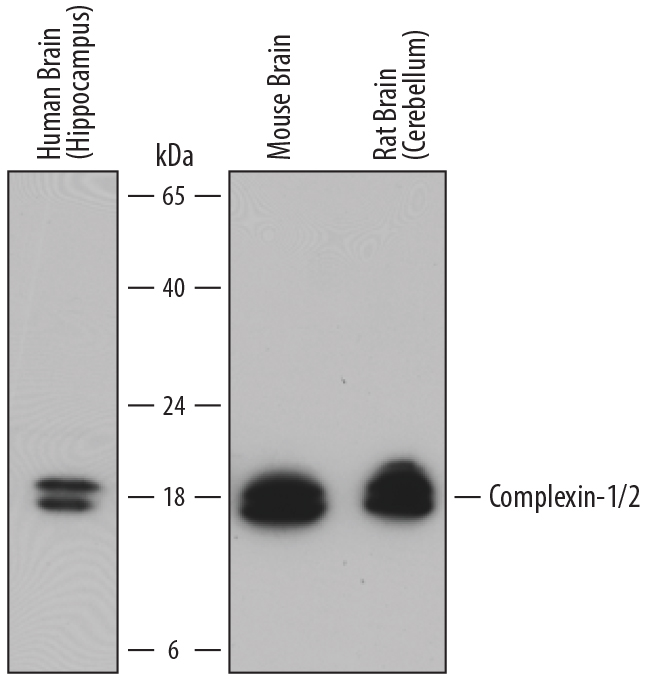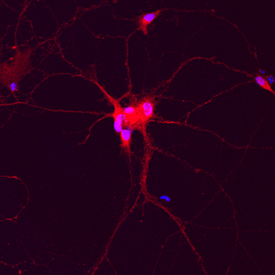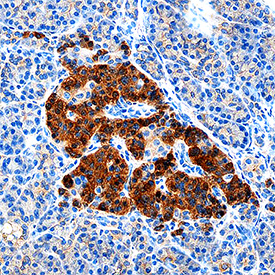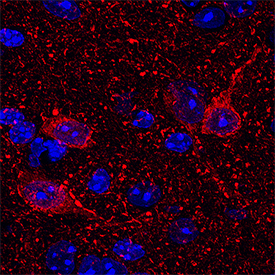Human/Mouse/Rat Complexin-1/2 Antibody Summary
Met1-Lys134
Accession # O14810
Applications
Please Note: Optimal dilutions should be determined by each laboratory for each application. General Protocols are available in the Technical Information section on our website.
Scientific Data
 View Larger
View Larger
Detection of Human, Mouse, and Rat Complexin-1/2 by Western Blot. Western blot shows lysates of human brain (hippocampus) tissue, mouse brain tissue, and rat brain (cerebellum) tissue. PVDF membrane was probed with 0.5 µg/mL of Goat Anti-Human/Mouse/Rat Complexin-1/2 Antigen Affinity-purified Polyclonal Antibody (Catalog # AF7787) followed by HRP-conjugated Anti-Goat IgG Secondary Antibody (Catalog # HAF017). Specific bands were detected for Complexin-1/2 at approximately 17-19 kDa (as indicated). This experiment was conducted under reducing conditions and using Immunoblot Buffer Group 1.
 View Larger
View Larger
Complexin-1/2 in Rat Hippocampal Neurons. Complexin-1/2 was detected in immersion fixed rat hippocampal neurons (14 daysin vitro) using Goat Anti-Human/ Mouse/Rat Complexin-1/2 Antigen Affinity-purified Polyclonal Antibody (Catalog # AF7787) at 10 µg/mL for 3 hours at room temperature. Cells were stained using the Northern-Lights™ 557-conjugated Anti-Goat IgG Secondary Antibody (red; Catalog # NL001) and counterstained with DAPI (blue). Specific staining was localized to cytoplasm. View our protocol for Fluorescent ICC Staining of Cells on Coverslips.
 View Larger
View Larger
Complexin-1/2 in Human Pancreas. Complexin-1/2 was detected in immersion fixed paraffin-embedded sections of human pancreas using Goat Anti-Human/Mouse/Rat Complexin-1/2 Antigen Affinity-purified Polyclonal Antibody (Catalog # AF7787) at 10 µg/mL for 1 hour at room temperature followed by incubation with the Anti-Goat IgG VisUCyte™ HRP Polymer Antibody (Catalog # VC004). Before incubation with the primary antibody, tissue was subjected to heat-induced epitope retrieval using Antigen Retrieval Reagent-Basic (Catalog # CTS013). Tissue was stained using DAB (brown) and counterstained with hematoxylin (blue). Specific staining was localized to cytoplasm in islet cells. View our protocol for IHC Staining with VisUCyte HRP Polymer Detection Reagents.
 View Larger
View Larger
Complexin-1/2 in Mouse Brain. Complexin-1/2 was detected in immersion fixed mouse brain (cortex) using Goat Anti-Human/Mouse/Rat Complexin-1/2 Antigen Affinity-purified Polyclonal Antibody (Catalog # AF7787) at 15 µg/mL for 3 hours at room temperature. Cells were stained using the NorthernLights™ 557-conjugated Anti-Goat IgG Secondary Antibody (red; Catalog # NL001) and counterstained with DAPI (blue). Specific staining was localized to cytoplasm in neurons. View our protocol for Fluorescent IHC Staining of Frozen Tissue Sections.
Reconstitution Calculator
Preparation and Storage
- 12 months from date of receipt, -20 to -70 °C as supplied.
- 1 month, 2 to 8 °C under sterile conditions after reconstitution.
- 6 months, -20 to -70 °C under sterile conditions after reconstitution.
Background: Complexin-1/2
Complexin-1 (CPX I; also synaphin-2) is a 17-18 kDa, cytosolic protein that belongs to the complexin/synaphin family, complexin-1/-2 subfamily of molecules. It is expressed in select neurons and pancreatic beta -cells, and serves as a block against premature neurotransmitter/insulin granule release. Both Complexin-1 and Complexin-2 bind to the SNARE complex that contains SNAP25, VAMP2 and STX1A, generating oligomers of SNARE complexes that are optimally oriented relative to the positions of vesicle and plasma membranes. This effectively places synaptic vesicles in an optimal configuration, allowing for a coordinated, uniform fusion and release upon appropriate stimulus. Typically, complexin-1 is described as a clamp that blocks (vesicle) fusion, and the stimulus that overcomes it is one that induces an influx of synaptotagmin-detectable calcium. Human complexin-1 is 134 amino acids (aa) in length. It contains one coiled-coil domain (aa 29-69) that incorporates part of a SNARE complex interaction sequence (aa 48-70). Full-length human complexin-1 shares 97% aa sequence identity with mouse complexin-1.
Product Datasheets
FAQs
No product specific FAQs exist for this product, however you may
View all Antibody FAQsReviews for Human/Mouse/Rat Complexin-1/2 Antibody
There are currently no reviews for this product. Be the first to review Human/Mouse/Rat Complexin-1/2 Antibody and earn rewards!
Have you used Human/Mouse/Rat Complexin-1/2 Antibody?
Submit a review and receive an Amazon gift card.
$25/€18/£15/$25CAN/¥75 Yuan/¥2500 Yen for a review with an image
$10/€7/£6/$10 CAD/¥70 Yuan/¥1110 Yen for a review without an image

